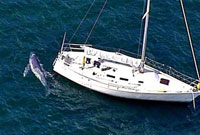Lost humpback whale calf Colin to be euthanized in Australia
An abandoned baby whale that has been attempting to suckle boats in the waters off north Sydney will be euthanized because it is in such poor condition, an environmental official said Thursday.

Veterinarians and marine researchers who spent the afternoon examining the whale found that it would likely not live through the night, said Sally Barnes, deputy director-general of the New South Wales Department of Environment and Climate Change.
"The calf was in much worse condition than they originally thought and the injuries were a lot worse than they thought as well, probably from a shark attack," she said. "We have taken the hard decision to put it down, unfortunately."
The plight of the whale, which Australians have nicknamed "Colin," has dominated news coverage here since it was first sighted Sunday and began trying to suckle from boats it apparently mistook for its mother.
"Our hearts are breaking with what's happening with baby Colin," New South Wales Premier Morris Iemma said. "It's looking bleak, but every effort is being made."
One effort came from Aboriginal whale whisperer Bunna Lawrie, who visited the calf Thursday afternoon. Adorned with feathers on his head and white paint markings on his face, Lawrie reached into the water to stroke Colin while singing a humming, tongue-rolling tune.
But after a few minutes the whale swam away to nuzzle a nearby yacht.
"He's missing the big fellas," said Lawrie, whose visit was broadcast on Channel 10 television.
The decision to euthanize the whale prompted a strong protest from a rescue group that designed a feeding apparatus intended to provide milk to the ailing calf.
"You said you'd give us a 24-hour stay of execution!" Brett Devine, a member of Devine Marine Group, shouted as environmental officials tried to calm him.
Some Australians have accused wildlife officials of not doing enough to help the calf or trying to feed it.
Previous attempts to guide the whale back to open waters have failed, with the creature preferring to stick close to the boats. Officials with the New South Wales National Parks and Wildlife Service were considering earlier Thursday whether to use an inflatable sling to tow the creature into deeper waters, where it has a better chance of connecting with other whales.
But in the end, there simply was no other option, a grim-looking Barnes said.
"This is certainly not what we would have hoped. We would have hoped that the animal would have been OK," Barnes said. "It's a very emotional thing."
As darkness fell, wildlife officials and veterinarians huddled in a private meeting to work out the logistics of the whale's fate.
They planned to sedate the animal, tow it to shore, and inject a dose of fatal drugs into its heart.
Subscribe to Pravda.Ru Telegram channel, Facebook, RSS!





